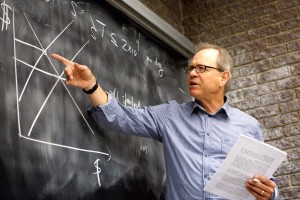
Economics profs team up to shed light on unfolding crisis
By Chris Chipello
It’s not often that a university course is conceived, approved and launched in just a few months.
But in the famously dry science of economics, these are no ordinary times.
Thanks to some fast work by Prof. William Watson and several colleagues in the Department of Economics, the 66 students enrolled in ECON 319 are getting an opportunity to study the field’s most dramatic crisis since the Great Depression, even as its effects continue to unfold.
Watson cooked up the course after a chat last fall with Prof. Tom Naylor about the wrenching upheaval in global financial markets. “The world economy looked like it was falling apart,” Watson recalled in an interview last week. Naylor “suggested we should do something about it” in the Department.
So Watson, the department’s chairman, got to thinking about how the fast-moving chain of events could be folded into an intermediate-level course. “The first idea was to call the course ‘The Economic Crisis,'” he said. But if the turmoil subsided more quickly than many feared, that title might look outdated by the time the course got approved. So “we decided to hedge our bets and call it ‘Economic Crises'” – to incorporate historic cases and “maybe give it some permanent life.”
Once before, in the early 1990s, Watson had put together a course tied closely to current events – Canada’s constitutional tumult and the then-raging debate over the economics of confederation. But while he had handled that earlier course on his own, he quickly realized that preparing 13 weeks of classes on this new, evolving financial crisis would require a lot of work for any single professor.
“It occurred to me that there’s no received wisdom yet, interpretations are in flux, and it would probably be good to expose students to the fact that when things are happening they aren’t settled and people don’t understand them. So let’s get everybody to come in and give their views.”
As a result, ECON 319 is a team-taught class, par excellence. The roster of professors includes Watson, Naylor, George Grantham, Robin Rowley, Tom Velk, Chris Green, Markus Poschke, Francisco Alvarez-Cuadrado, Franque Grimard and Jean-Marie Dufour. Their specialties run from economic history to banking to developmental economics.
“It’s clear that there are different interpretations” of the still-simmering crisis, Watson noted. There is the “government-is-the-solution argument, and government-was the-problem school” of thought, and “our students will be getting both.”
There will also be guest lectures by prominent Ottawa visitors: Watson has tentatively lined up a Deputy Governor from the Bank of Canada, the head of current economic analysis at Statistics Canada, and Prof. Chris Ragan, who is on leave from McGill to serve as the Clifford Clark Visiting Economist at the Department of Finance.
Just last week, U.S. Federal Reserve Chairman Ben Bernanke cheered markets by declaring the recession “very likely” over. But the following morning, Grantham, an economic historian, concluded his ECON 319 lecture on a sobering note: The U.S. could eventually be forced to boost interest rates to maintain the overseas market for its massive debt load – a move reminiscent of one by Great Britain in the 1920s, which contributed to the Great Depression.
The lectures are on Mondays and Wednesdays. Watson leads a class discussion on Fridays, and the students appear to be eagerly engaged – for good reason.
As Watson notes, the story of the crisis is “ongoing, we don’t know how it’s going to end” and for students preparing to venture onto the job market in coming years, “it’s their own lives that are involved.”
